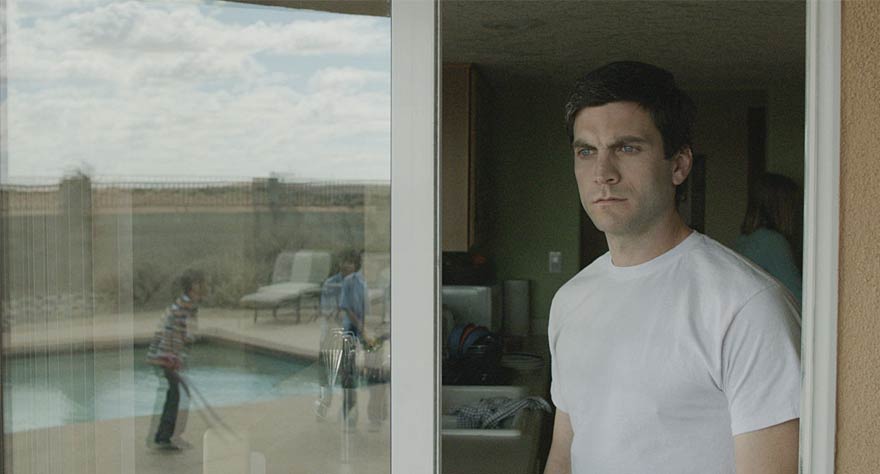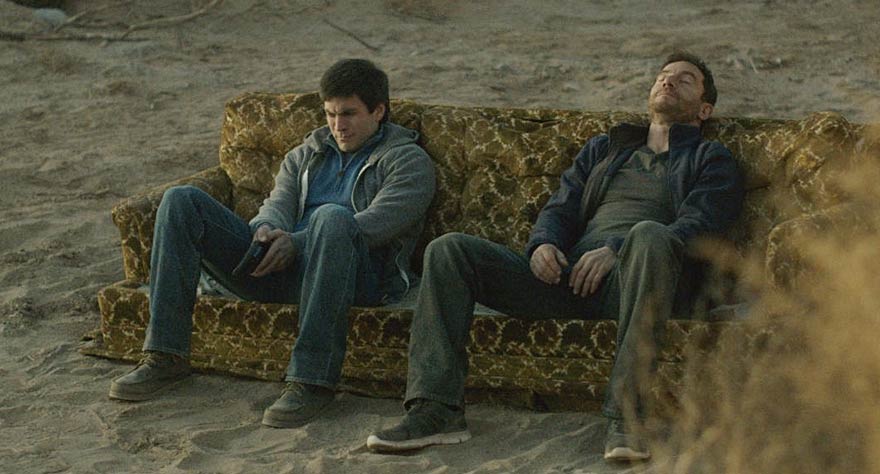
A suburban man turns to crime but doesn't manage to quite be a criminal.

A suburban man turns to crime but doesn't manage to quite be a criminal.
A lot of bad came from the recent economic recession, but as far as entertainment goes one upside was the emergence of the kind of drama we could each of us relate to. Our love for forensic science and superheroes will never fade, but recent years have brought us a new common denominator. The gritty down-on-his-luck anti-hero, driven to great and terrible things by the forces most of us have felt. The most obvious and recent character audiences embraced in this category is Breaking Bad’s Walter White, and indeed it’s nearly impossible to watch After The Fall and not think of him.
In the film Wes Bentley is well cast as Bill Scanlon, a mild-mannered insurance adjuster. Devoted to his family and determined not to worry them or admit defeat, he keeps it to himself when he loses his job, choosing instead to leave the house every morning as though going to work, and spending his days in parking lots and his car trying to find other work. His wife Susan (Vinessa Shaw) is none the wiser and his two sons carry on as usual. When the pressures of having no income pile up and the stream of judgement from his wealthy father-in-law roll over him, he finds himself taking his gun out of his safe and wandering out into the desert outside his Albuquerque suburban neighborhood to potentially do something drastic. But while Bill hardly has the demeanor for suicide, he stumbles into a model home and happens across a philandering couple. They see the gun, offer up their wallets, and finding the whole affair to be a lot easier than he’d ever have imagined, Bill takes it.
This introduction to easy money kickstarts Bill’s life of crime, mostly restricted to petty theft of small businesses. With his new income, Bill finds his confidence come back to him, and by preying on those who he’s noticed to be rather deserving of punishment anyway, he’s able to justify his behavior as somewhat altruistic. Of course, Bill can’t help but be the innately good guy that he is, so it’s no surprise when he makes friends with the lonely and distraught cop Frank (Jason Isaacs). Frank begins to investigate the building cases of theft at gun point while simultaneously getting to know Bill and his family. The inevitability of Frank connecting the dots is a no-brainer, but the intriguing parts of this film lie in Bill’s own guilt around his actions.
First time director Saar Klein has most notably built his career around editing—a few times for the great Terrence Malick. His film has a dreamy neutral-toned feel to it that is very Malick-esque and his pacing and dedication to themes of relationship in the film are also similar. However, unlike Walter White, living in a similar Albuquerque suburb and choosing a similar career path of crime, Bill’s motivations seem entirely less plausible and less gripping. His choices reflect that of a coward at best, and even more so as those of happenstance. More intriguing are the decisions of those around him. Wes Bentley is an excellent actor, and he plays Bill with a likable innocence that makes his crimes more funny than dramatic. What’s missing is another level of depth to Bill, not written into the script. A sense of how his actions change him, as it seems plausible any sort of dramatic turn as this would leave him different. Or even a further analysis of the darkness inside Bill that would make him capable of this level of deceit.

Similarly Isaacs’ detective Frank wears his issues on his sleeve, openly showcasing his self-imposed exile as divorcée and missing father. Even his gruff accent paints a sense of obviousness on him. Add a stereotypical drunkenness and penchant for guns and here’s a typical movie cop. Adding to the confusion is a horribly misrepresentative movie poster. Wes Bentley with gun in hand and an American flag behind him? The silly tag line of “Desperate times call for dangerous measures.” If it’s meant to be ironic, I have a feeling that will be lost on most people. This is not an action film. Bill Scanlon isn’t an all-American man.
After the Fall starts strong, pulling in anyone who recalls the difficulty of the recession or relates to a man on the brink. And don’t get me wrong, I love a story of moral ambiguity, but Klein fails to push in further leaving us wanting. Bill’s tale is interesting, and the ending certainly leaves us with no real sense of closure, but more than that is a lack of layers in Bill’s character and psyche that might make him more interesting to watch and certainly more appealing to root for. He’s not a hero, he’s not an anti-hero. He’s an accidental criminal with a guilt-complex.
Originally titled Things People Do, the film’s old title perfectly sums up the surface-level of complexity the film offers. However, the new title implies a level of depth it simply doesn’t deliver. Klein proves he can handle the behind the camera elements of filmmaking and the editing room to boot, but he might try his hand at someone else’s writing next time if he wants the attention he deserves.
After the Fall opens in limited release and on VOD Dec. 12.